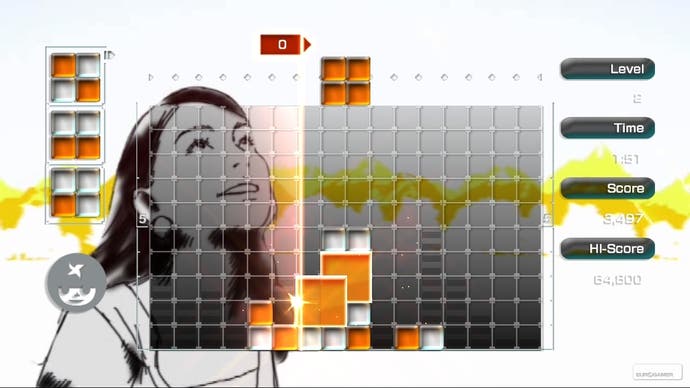Q Entertainment's Tetsuya Mizuguchi
Remakes, revolutions and the future of media.
I'm their producer. Myself and another guy, called Kenji Tamari - he's purely a music producer - are the creators of Genki Rockets. Our front act is a girl called Lumi, who sings and performs, with the concept, the music and lyrics being provided by Kenji and I.
Genki Rockets is the same as the case of Ninety-Nine Nights. Musically and visually, I wanted to express a new kind of style - everything moving with the musical sounds, a synaesthesia kind of experience, like Rez and Lumines. Of course, this isn't interactive - but this is broader and very accessible, so people can instantly "get" the kind of new musical, visual style and message. The message is very important to me, with Genki Rockets.
The idea is that it's the point of view of a human being from the future. She's a 17-year-old girl, living thirty years in the future - it's our future, very soon. She's the first human being to be born in outer space - this is the inspiration. She's always watching the blue planet, seeing no borders, but also watching the news and all the media from Earth - getting this feed of information, seeing the Dow Jones go up or down a point, wars breaking out, lack of water, pollution, perhaps global warming... But nothing changes, from her point of view.
My concept, all the time, is that technology always gives us a new point of view. Look at airplanes - just 100 years ago, some guy flew an airplane and saw the city he'd always lived in. Before that, we'd always had one point of view - very flat. Airplanes gave us a new point of view, where we could go up and say, "wow, I live here, in this kind of city". It was a new kind of inspiration, it drove a new kind of creativity, of expression. That was Futurism, which appeared in Italy 100 years ago - Futurismo. I think that going out into space and watching our entire planet, just 45 years ago... Before that, we'd never seen our own planet that way. That kind of point of view changes how we think, how our minds work.

Right - and it also introduced us to multitasking, the idea of doing many things at once on the same screen. Fifty years ago, if people had watched you multitasking, with different windows and lots of conversations at once, they wouldn't have understood what was happening. It would just have been too much. Whereas now, our brains are changing - we keep on changing as the times and the eras change. Our brains actually need that kind of process now, that multitasking! If you look thirty years, forty years, fifty years into the future, our descendants - our children, and the children of the future - will want much more. They'll demand more sophistication, not just from having many, many, many more flows of information, but how they think will be a very sophisticated, beautiful process.
The mind improves - it gets better and better. At least, I hope so! Anyway, the point of all this is that technology always changes our minds. It constantly gives us new inspiration - and every product should try to do that.
I think that we will change dramatically in this century. We'll have to stop using oil, for example, and new technology will come along. That will change us, like other technology has.
It's partially that, as a producer, I know that we can take very strong concepts and build handheld games with just ten people, fifteen people. It's easier to design and develop, although it's still very difficult to make!
On the other side, with something like Ninety-Nine Nights, I needed a hundred people - there was a strong concept and creative inspiration, and it's easy to design a product like that, but we had to find a really good studio to develop it. Now, there are a lot of really good studios in the world - but five years ago, that was very tough. I had the experience of making Rez and Space Channel 5 on PlayStation 2 and Dreamcast. Even on PlayStation 2, I was dreaming that there was this kind of audience, these kind of players, who would want to play my game - casually. But the game console is not casual, as media - especially the PS3 or Xbox 360.
When I think about music interactive type games, I think they appeal to an outer group of people. There's still a big hurdle there, with the audience for high-def consoles. PSP, though... PSP is getting casual, I think. Lots of people use them to watch recorded TV, to listen to music downloads. That's a big plus. Xbox 360's Live Arcade, too, gives people the ability to casually play and try things out. That was a big hurdle, too. When we did Rez on the PS2 and Dreamcast, lots of people just didn't understand the game, what it was about - and they might have wanted to try it out, but it was impossible. Now it's getting easy to try before you buy. I think that's the future.

Making music, maybe, or writing books - writing novels.
Travelling. That's how I play - it's like playing life. Just taking a one day or two day trip, going to Okinawa or to a really small island, with nobody there. No plans. I just love thinking all the time - thinking and imagining things all the time. Imagining how I could make things, or some kind of visual or story. For that, I always need a new kind of inspiration, but when I play other people's games, I don't get that kind of inspiration. It's because I'm a professional game designer - I need a new, fresh, other kind of inspiration, all the time. I don't really feel any new inspiration from movies now, either. Before, yes, but not now - not any more.
It's because I've changed, yeah. I changed. I used to get huge inspiration from old movies, things like Blade Runner.... Actually, I think that movies have changed too. They're becoming more similar, following really typical storylines, with no new, fresh surprises. I always want a big surprise, a new inspiration.
So instead, backpacking! Always backpacking. It's a really fresh experience. If I just made a reservation for a really good hotel, it wouldn't be a surprise or new experience, not any more.
I'm always thinking about travelling, and where I'll go next.
Tetsuya Mizuguchi is COO and a founder of Q Entertainment.
